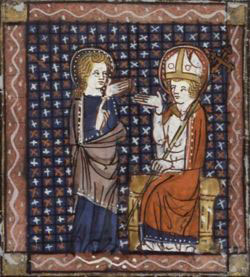In reading Holy Scripture and the lives of the saints, we are reminded of how often God takes sinful, fallen men whose lives have been anything but exemplary and, through his merciful kindness, brings them to repentance and change of heart so that others may revere them and look to them for help toward sanctification. The thief on the Cross, through his penitent cry to our Lord Jesus Christ, “Remember me in your kingdom” was forgiven by God, admitted to Paradise, and is known to us as St. Dismas. The militant enemy of the church, Saul of Tarsus, was so converted by a vision of the risen Christ that he became St. Paul, the great missionary and teacher. For some, such as St. Britius of Tours, this tranformation of life came gradually through many years, and sometimes through suffering great penance.
As a young man, Britius was sent to the monks of the monastery at Marmoutier, near Tours, for his education, and there he stayed to become a monk also. But this young monk lacked humility and respect for others. The abbot of the monastery was St. Martin, who was also Bishop of Tours and who was loved and revered as a saintly man while still in this life. But arrogant Britius was critical of the saint, calling him “crazy” on some occasions and at other times accusing him of falling into superstition. After each of these instances of slander, Britius asked the saint’s forgiveness, but his tongue was not long bridled.
Despite this sinful behavior, Britius progressed well in other ways. His studies were completed successfully and he was ordained a deacon by Bishop Martin. He was respected by his fellow monks and by the people of the surrounding area as a capable leader. So it was not surprising when the aged Bishop Martin predicted that Britius would succeed him as the shepherd of the people of Tours and as the abbot of the monks of Marmoutier. This happened upon the repose of St. Martin in the year 397.
Bishop Britius’ penance had just begun. Although he was a good and loving leader of his people, his sharp tongue and irascible demeanor were hurtful to some people and they struck back at the bishop with false accusations. Just as he had inflicted this pain upon St. Martin, Britius now had to endure the verbal attacks of others. Remembering the admonition in St. James’ Epistle, “If anyone among you thinks he is religious, and does not bridle his tongue but deceives his own heart, this one’s religion is useless” [James 1:26], Britius began to soften his manner and to be more gentle in his dealings with others.
But his worst penance was yet to come. One of the ways in which Britius was completely above reproach was in purity of body. He had taken the vow of chastity as a young monk and had never violated that vow. But when he had been bishop for 33 years, a woman who did laundry for the monastery accused him of fornication, and the people rose up against him.
In an attempt to clear his name, Britius appealed to the Patriarch in Rome and as he was traveling there, the people of Tours elected a new bishop. Although the pope eventually exonerated him, Britius had been deposed from his bishopric and remained in exile, lamenting his earlier sins. Finally, after seven years, he returned to Tours and his episcopacy on the death of the bishop who had replaced him.
God granted Britius seven more years in this life and, with great energy and zeal, the bishop served him faithfully and humbly. The much chastened and repentant saint fell asleep in the Lord in the year 444.
Through all the centuries since then, St. Britius has been remembered – not for his capable leadership, sound teaching, or missionary endeavors – but for his repentance. May St. Britius pray for us that we may also be repentant and amend our lives to conform to God’s will.
Sources: Oxford Dictionary of Saints, by David Farmer; Vita Patrum: The Life of the Fathers, by St. Gregory of Tours, tr. Fr. Seraphim Rose.
